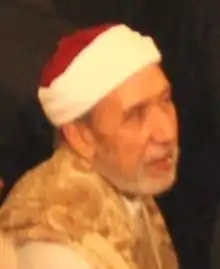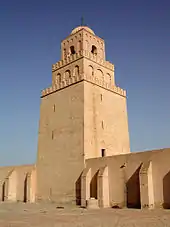Othman Battikh
Othman Battikh (عثمان بطَيخ) (born April 17, 1941) is a Tunisian Islamic scholar, Grand Mufti of Tunisia, and former member of the Tunisian government.
Othman Battikh | |
|---|---|
 Othman Battikh in 2011 | |
| Grand Mufti of Tunisia | |
| Personal details | |
| Born | 17 April 1941 |
| Nationality | Tunisia |
| Occupation | Islamic scholar |
Biography
Born into a modest Tunisian family, his father worked as a hairdresser. He studied at the Franco-Arab school and attended secondary school at the University of Ez-Zitouna spending the first two years attached to the Saheb Ettabaâ Mosque then the second two years at the Ibn Khaldoun school at Zitouna. He continued his studies at the l'École supérieure de droit de Tunis (School of Law of Tunis) under Mohamed Fadhel Ben Achour, Mohamed Malki, Mohamed Ben Slama and Mohamed Annabi. After his studies, he worked as a judge (magistrat au Tribunal de première instance) in Tunis for three years and then returned to Zitouna for four years to continue his studies focusing on Islamic law (fiqh) and comparative law with a specialty in the Code of Personal Status (Tunisia) which bans polygamy, emphasizes the equality of the sexes, and does not enforce the hijab.
In 2008, Battikh Othman was appointed the Grand Mufti of Tunisia, the most senior Muslim religious position in the country, by President Zine El Abidine Ben Ali. In April 2013, he caused controversy in the media when he alleged that Tunisian girls were visiting Syria to take part in a sexual jihad,[1] the phenomenon of giving sexual services to terrorists fighting in Syria under the name of religion.[2][3] In July 2013, President Moncef Marzouki replaced him as Mufti with Saied Hamda;[4] Othman alleges that he was replaced as punishment for speaking out.[1] On February 2, 2015, he was appointed Minister of Religious Affairs in the government of Prime Minister Habib Essid.[5]
On 5 January 2016 an enquiry was opened at the Tribuanl of First Instance of Tunis in relation to financial overspends which the minister was said to have carried out at the time of his last pilgimage to Mecca.[6] On the next day, he was replaced by Mohamed Khalil at the head of the Ministry of Religious Affairs.[7] On 12 January, he was re-appointed Mufti of the Republic by President Béji Caïd Essebsi.[8]
Battikh is seen as a moderate[9] and has been critical of Salafi and Wahabi doctrine.[10]
References
- BBC: "Tunisia's 'sexual jihad' - extremist fatwa or propaganda?" 26 October 2013
- El Alam: "Mufti: serving Syrian terrorists sexually is haram - Giving sexual services to terrorists under the name of religion (jihad) in Syria constitutes adultery, which is religiously haram (forbidden), according to the Mufti of Tunisia." April 20, 2013
- New York Daily News: "Women, girls travel to Syria to commit ‘sex jihad’ by sleeping with multiple Islamist fighters" By Deborah Hastings September 20, 2013
- Tunivisions: "Tunisie, Affaires religieuses: Nouveau Mufti pour la Tunisie: Hamda Saied remplace Cheikh Othmane Battikh à 3 jours de Ramadan" by A.CHENNOUFI July 7, 2013
- Business News Tunisia: "Composition de la version nouvelle du gouvernement Essid" February 2, 2015
- "Le ministre des Affaires religieuses, Othman Battikh dans le collimateur de la justice" (in French). 5 January 2016.
- "Tunisie : liste complète des ministres du nouveau gouvernement Essid" (in French). 6 January 2016.
- "Othman Battikh nommé mufti de la République" (in French). 12 January 2016.
- Islamopedia: "Sheikh Othman Battikh" Archived 2016-04-05 at the Wayback Machine retrieved March 4, 2015
- Middle East Online: "Tunisia activists file suit against female circumcision preacher - Activists sue visiting Egyptian Muslim preacher Wagdy Ghoneim for inciting hatred, advocating polygamy, female circumcision" By Cecile Feuillatre February 15, 2012
External links
- Portrait d'Othman Battikh (Al-Arabiya) Arabic
- Babnet: "Biographie de Othman Battikh ministre des Affaires religieuses" 02 Février 2015 (French)
